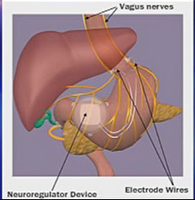New device test, alternative to gastric bypass surergy

Portland, OR
Oregon Health and Science University is testing a new implantable device that promises to reduce or eliminate hunger pains.gastric bypass malpractice lawsuit atorneys
The device is implanted just underneath the skin near the stomach.
Normally, a particular nerve in your abdomen tells your brain if you're hungry. But this new device sends signals up certain wires, blocking the message of hunger.
OHSU doctors say 15 million obese people in the U.S. could benefit from what's called VBLOC therapy.
The surgery is less risky than gastric bypass and should be less expensive.
Previous studies show obese people lost about 20 percent of their weight after using the device for one year.
Dr. Bruce Wolfe, the OHSU surgeon in charge of the study, said the device is only for the obese rather than just someone who wants to lose 10 or 15 pounds.
"It still is surgery," Wolfe said. "General anesthesia is required. There are incisions made. So it's possible to have a complication. By virtue of it being a less invasive procedure, it's reasonable to predict that serious or life-threatening complications will be quite few."
OHSU is now looking for candidates for the experimental trial. Doctors will see how well it works over the course of five years.
Right now, people with the device must also wear a battery pack outside their body, shaped like a small ring. Doctors expect it to be completely implantable in the future.
If you want to be part of the study, informational meeting will begin Wednesday and will be held through April 2 at OHSU. Call 1-866-356-4199 for more information.
Click here to find out more!
Labels: bariatric surgery, gastric bypass surgery alternatives

0 Comments:
Post a Comment
<< Home